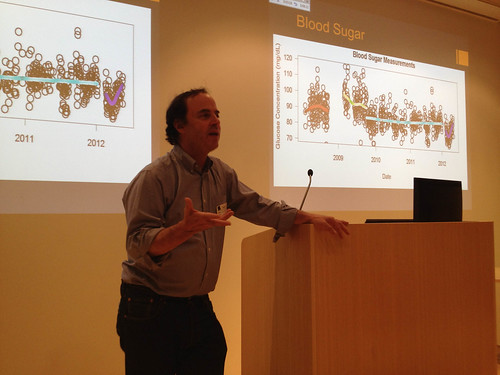Like many people, I first heard about him back in 2006 through a chapter in the best-selling book Freakonomics. His strange habit of tracking various aspects of his life -- his sleep, his sense of balance – appealed to me in a geeky way. As a long-time self-quantifier myself, I found it reassuring to know that there were others out there, similarly interested in the practical day-to-day usefulness of science. Eventually I found his blog, and discovered that he was living near me in Beijing. A famous professor like him – a New York Times bestselling author and all that – might be hard to get ahold of, but one day out of the blue I sent Seth an email, wondering if he’d like to get together for lunch.
He replied in minutes and said sure, how about tomorrow? I was so excited (such a famous guy!), and I invited him to the cafeteria at my office (then at Microsoft in Beijing). We exchanged unconventional ideas, the kind I suspect are true but that I don’t necessarily want to say in public (but that he posts unashamedly to his blog): how radiation is actually good for you, how if you want to lose weight you should only drink real coke, not the diet kind, about the benefits of homemade yogurt. We talked about Zeo and microbes and personal experimentation to see what works and what doesn’t. It was a classic Seth Roberts conversation – challenging conventional wisdom, never taking anything for granted -- and I was hooked.
Later I invited him as a guest speaker at Microsoft (that’s a photo below). He introduced me to Steve Hansen, founder of Phonemica and another fascinating expat living in Beijing. The three of us got together regularly after that, always having amazing conversations. We talked about everything – unconventional ideas about pedagogy, the history and future of China, how little science really understands about diet and nutrition, about sleep.
Although Seth was very sharp about most things, there was always one nagging area where I thought he was underprepared. I wanted him to pay more attention to the rise of sensors, mobile devices, and all the incredible new self-tracking and discovery they make possible. He dismissed them mostly as “lipstick on a pig” ideas. Scientists know practically nothing about the real causes of illness and wellness – what good can technology do if we don’t even have a basic framework for understanding the basics about health?
He wasn’t impressed with Zeo, for example. He preferred keeping his own sleep journal, the old fashioned way with pencil and paper by his bedside. Most of his self-measurement was done with a stopwatch and paper. Come on, Seth, at least get an iPhone and enter the information online!
To prove him wrong, earlier this year I built a quick iPhone implementation of the analysis routines he was using on his PC. He had a script written in the statistical language R, and had accumulated quite a trove of data for himself. I made a basic implementation for iOS and showed him: see, you could have the same thing on a device that you carry with you everywhere!
He was intrigued. We got him an iPhone that he can use in both the US and China, and started communicated daily, through email and Skype, about the app. He can be very demanding, very obsessed with things I thought were trivial cosmetics. I would make a new build, send it to him for feedback, and he would always write back immediately, usually frustrated at my basic lack of understanding. Then we’d talk over the phone until I figured out what he meant; I’d go back and program some more, and repeat.
It was obvious that he had been carefully honing for years the techniques that he was (trying) to) teach me. “Imagine if anyone could find out, for themselves, which foods are good for them, which activities hurt their brain power and which help.” He had already discovered some interesting things about himself this way; he could only imagine what would happen if this self-tracking power were in the hands of more people.
He was just settling in at Berkeley for the summer and we talked about the future. He was more optimistic about the app itself than I was. Normal people aren’t going to use this thing, I said. It’s too much effort. They’ll need to first understand more of the thinking behind it: they’ll need training, books, conferences. Seth will need promotion, turning him into a force like Chris Kresser, say, Dave Asprey, or Tim Ferris.
He thought about it a little and then said, no, the person he really admires is Nassim Taleb: to be able to be associated with an idea like the Black Swan, with friendships and associations with other really smart, unconventional people, with the freedom to think and explore the ideas whereever they lead.
He said this summer he was looking forward to lots of writing, and preparing for a talk at the Ancestral Health Symposium. He wanted to finish his book. And of course, much, much self-experimentation.
I woke up on Saturday morning with an email for a bunch of changes he wanted from our app. I finished some, sent them to him for feedback, and he replied right away: it wasn’t good enough. I had other plans for the day, so I told him I’d get back to him tomorrow. Then he went for a hike.